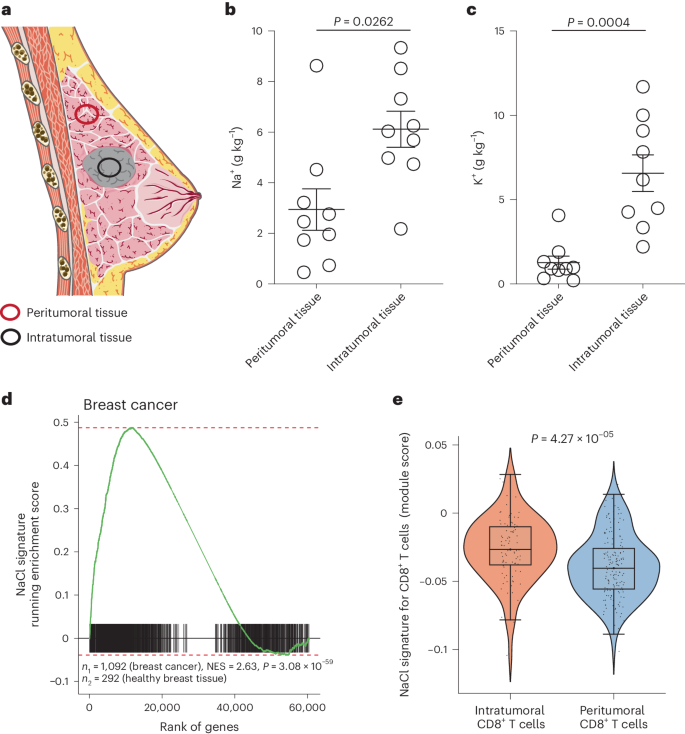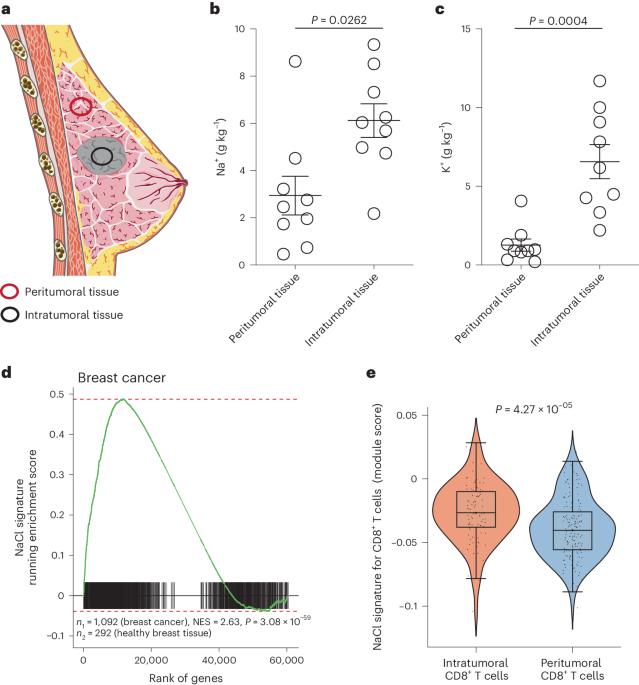肿瘤微环境中的氯化钠可增强 T 细胞的代谢能力和细胞毒性
IF 27.7
1区 医学
Q1 IMMUNOLOGY
引用次数: 0
摘要
抗肿瘤免疫的有效性与细胞毒性 T 细胞的代谢状态有关,而细胞毒性 T 细胞的代谢状态对肿瘤微环境非常敏感。离子信号是否会影响适应性抗肿瘤免疫反应尚不清楚。在本研究中,我们发现乳腺癌患者的实体瘤中富含钠。氯化钠(NaCl)能增强人类 CD8+ T 细胞的活化状态和效应功能,这与新陈代谢能力增强有关。这些氯化钠诱导的效应可转化为体外和体内肿瘤细胞杀伤力的增强。从机理上讲,NaCl 诱导的 CD8+ T 细胞变化与钠诱导的 Na+/K+-ATP 酶活性上调有关,其次是膜超极化,这放大了 T 细胞受体(TCR)诱导的钙离子流入和下游 TCR 信号传导的电动力。因此,我们提出,NaCl 是急性抗肿瘤免疫的正向调节因子,可用于体内外治疗性 T 细胞(如 CAR T 细胞)的调节。本文章由计算机程序翻译,如有差异,请以英文原文为准。


Sodium chloride in the tumor microenvironment enhances T cell metabolic fitness and cytotoxicity
The efficacy of antitumor immunity is associated with the metabolic state of cytotoxic T cells, which is sensitive to the tumor microenvironment. Whether ionic signals affect adaptive antitumor immune responses is unclear. In the present study, we show that there is an enrichment of sodium in solid tumors from patients with breast cancer. Sodium chloride (NaCl) enhances the activation state and effector functions of human CD8+ T cells, which is associated with enhanced metabolic fitness. These NaCl-induced effects translate into increased tumor cell killing in vitro and in vivo. Mechanistically, NaCl-induced changes in CD8+ T cells are linked to sodium-induced upregulation of Na+/K+-ATPase activity, followed by membrane hyperpolarization, which magnifies the electromotive force for T cell receptor (TCR)-induced calcium influx and downstream TCR signaling. We therefore propose that NaCl is a positive regulator of acute antitumor immunity that might be modulated for ex vivo conditioning of therapeutic T cells, such as CAR T cells. In this paper and the related paper from Lugli and colleagues the authors show that high levels of NaCl inside the tumor have a beneficial effect on CD8+ T cells and their ability to control tumor growth as a result of enhanced T cell receptor activity.
求助全文
通过发布文献求助,成功后即可免费获取论文全文。
去求助
来源期刊

Nature Immunology
医学-免疫学
CiteScore
40.00
自引率
2.30%
发文量
248
审稿时长
4-8 weeks
期刊介绍:
Nature Immunology is a monthly journal that publishes the highest quality research in all areas of immunology. The editorial decisions are made by a team of full-time professional editors. The journal prioritizes work that provides translational and/or fundamental insight into the workings of the immune system. It covers a wide range of topics including innate immunity and inflammation, development, immune receptors, signaling and apoptosis, antigen presentation, gene regulation and recombination, cellular and systemic immunity, vaccines, immune tolerance, autoimmunity, tumor immunology, and microbial immunopathology. In addition to publishing significant original research, Nature Immunology also includes comments, News and Views, research highlights, matters arising from readers, and reviews of the literature. The journal serves as a major conduit of top-quality information for the immunology community.
 求助内容:
求助内容: 应助结果提醒方式:
应助结果提醒方式:


